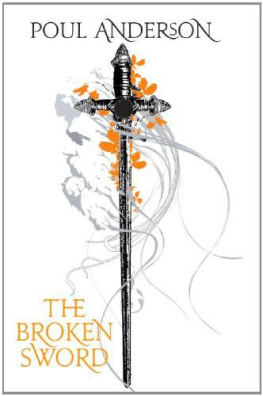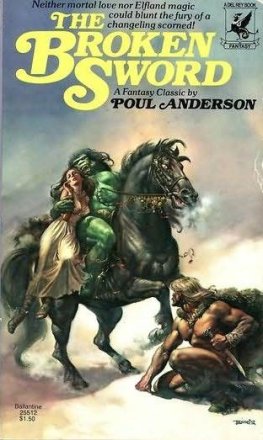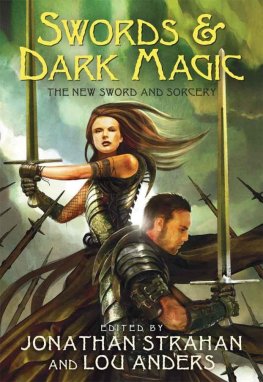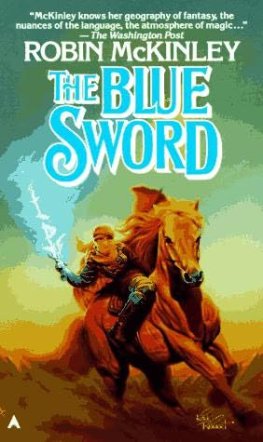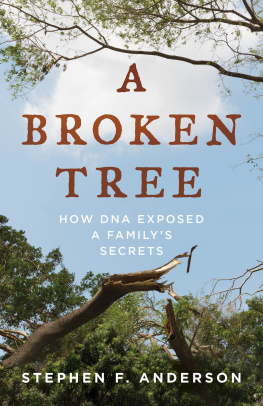It has a wonderful, wild, manic originality, a driving story and a genuine feel of the grim realities informing the Anglo-Saxon myth and legend which few other fantasies possess. The inevitability of its drama, its dooms and its emotional conflicts made this one of the most influential fantasy novels I ever readMichael MoorcockThis book is a stunner, and a must for every fantasy lover Asimovs Poul Anderson wrote fantasy of harsh truth and driving narrative, imbued with the energy and the wild beauty of the old Norse talesRobert HoldstockChangeling humans become tragically entangled with the fate of the elves, in a tale full of dark savagery and lyrical magic. Anderson taps the authentic vein of Norse myth, but, like Tolkien, recreates it in his own unique styleMichael Scott Rohan
Conan
Elric
Lankhmar
Lyonesse
Lud-in-the-Mist
The Broken Sword
The Chronicles of Amber
The Dragon Waiting
A Gollancz eBook
Copyright Poul Anderson 1954
All rights reserved.
The right of Poul Anderson to be identified as the author of this work has been asserted by him in accordance with the Copyright, Designs and Patents Act 1988.
This edition first published in Great Britain in 2002 by
Gollancz
The Orion Publishing Group Ltd
Orion House
5 Upper Saint Martins Lane
London, WC2H 9EA
An Hachette UK Company
This eBook first published in 2010 by Gollancz.
A CIP catalogue record for this book is available from the British Library.
ISBN 978-0-575-10184-5
All characters and events in this publication are fictitious and any resemblance to real persons, living or dead, is purely coincidental.
No part of this publication may be reproduced, stored in a retrieval system or transmitted in any form or by any means, without the prior permission in writing of the publisher, nor to be otherwise circulated in any form of binding or cover other than that in which it is published without a similar condition, including this condition, being imposed on the subsequent purchaser.
www.orionbooks.co.uk
Contents
There was a man called Orm the Strong, a son of Ketil Asmundsson who was a great landsman in the north of Jutland. The folk of Ketil had dwelt in Himmerland as long as men remembered, and were mighty landowners. The wife of Ketil was Asgerd, who was a leman-child of Ragnar Hairybreeks. Thus Orm came of good stock, but as he was the fifth living son of his father there could be no large inheritance for him.
Orm was a great sea-farer and spent most of his summers in viking. When he was in his twentieth winter, he went to his oldest brother Asmund and said, Now you have been sitting in Himmer-land and having the use of the farm for some years, and your brothers grow restless for a share. But it is plain that if we divide it five ways our family will sink from great landsmen to smallholders, and soon be lost and forgotten.
That is true, replied Asmund, and if you will not yield the inheritance it were best we steered it together.
I will not be fifth man at the rudder, said Orm, and so I will make you this offer: give me three ships, and outfit them, and supply arms to all who will follow me, and I will find my own land and quit all claim on our fathers.
Asmund was well pleased with this, the more so since two more of the brothers said they would go with Orm, and ere spring he had bought longships and all their outfit and found many of the younger and poorer men of the neighborhood who would be glad to fare westward. On the first clear day of spring, when the seas still ran high, Orm took his ships out of the bay, and that was the last Asmund ever saw of him.
The dragons turned their tails to the low gray moors and the high cloudy sky of Himmerland. With wind piping in their riggings and sea-gulls screaming about the mastheads and the strakes foaming, they pointed their heads westward. Orm made a verse:
White-maned horses (hear their neighing!), gray and gaunt-flanked, gallop westward. Wild with winter winds, they snort and buck when bearing burdens for me.
By starting thus early, Orm reached the western islands ahead of most other vikings and had a good plundering. With this he bought more ships and gathered a following while he lay in Ireland over the winter.
Now for some time Orm harried the western lands and had a great booty. But he wished for land of his own, and so one summer joined his fleet to the great one of Guttorm, or Guthrum as the English called him. For some time he was with Guthrum ashore as well as at sea, and when peace was made with Alfred, Orm went into the Danelaw to seek land.
He found a green and fair tract beside a little bay where he could keep his ships. An Englander already dwelt there, but Orm ringed his house with men one night and burned it. The man, his brothers, and most of his household perished then. Some say that the mans mother, who was a witch, escaped the fire for the burners let all women and children and thralls that wished leave first and laid the curse on Orm that his eldest son should be fostered beyond the world of men, while Orm should in turn foster a wolf that would one day rend him.
Now Orm built a great house and other buildings on his newly gained land, and with the wealth and fame he had he was accounted a mighty chief in the Danelaw. When he had sat there a year, he felt it were well if he had a wife. He rode with a great following to the English ealdorman Athelstane and asked for his daughter Aelfrida, who was said to be the fairest maiden in England.
Athelstane dared not refuse, but Aelfrida said to Orms face: Never will I wed a heathen dog, nor indeed can I. And while it is true you can take me by force, you will have little joy of me that I swear.
She was small and slender, with soft ruddy-brown hair and flashing gray eyes, while Orm was a huge bulky man with face burned red and hair nearly white from years of sun and sea. But he felt she was somehow the stronger, so after thinking for a while he said: Now that I am in a land where folk worship the White Christ, it might be well if I made peace with him as well as his followers. Indeed, most of the Danes have already done so. I will be baptized if you will wed me, Aelfrida.
That is no reason, she cried.
But think, said Orm slyly, if you do not wed me I will not be christened, and then, if we may trust the priests, my soul is lost. And you will have to answer heavily to your God for losing a human soul. He whispered to Athelstane, Also, I will burn down this house and throw you off the sea-cliffs.
Aye, daughter, we dare not lose a human soul, said Athelstane very quickly.
Aelfrida did not hold out much longer, for indeed Orm was a not ill-looking man, and he was known to be rich and powerful. So Orm was christened, and the next day he wed Aelfrida and bore her home to the Danelaw. They lived together contentedly enough, if not always peacefully.
There were no churches near, so at Aelfridas wish Orm kept a priest on the land, and for atonement of his sins he paid the priest well. But being a careful man with no wish to offend any of the Powers, Orm continued to sacrifice to Thor in midwinter and to Freyr in spring for peace and good harvests, as well as to Odin and Aesir for luck before each sea-voyage.
All that winter he and the priest quarreled about this, and in spring, not long before Aelfridas child was born, Orm lost his temper and kicked the priest out the door and bade him begone. Aelfrida reproached him greatly for this, until he cried that he could stand no more of that woman-chatter and now would have to flee it. A few days later, earlier than he had planned, he left with his ships and spent the summer harrying in Ireland and Scotland.
Scarce were his ships out of sight when Aelfrida was brought to her bed and gave birth to a child. It was a fine big boy who after Orms wish she called Valgard, a name old in that family. But now there was no priest to christen the child, and the nearest church lay a good two or three days journey away. She sent a thrall there at once.
Next page
